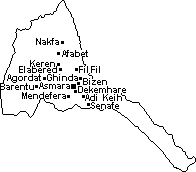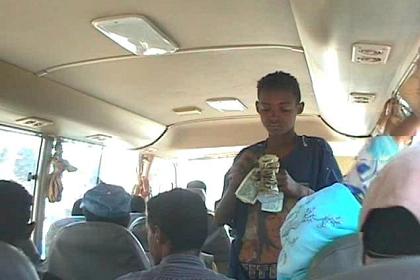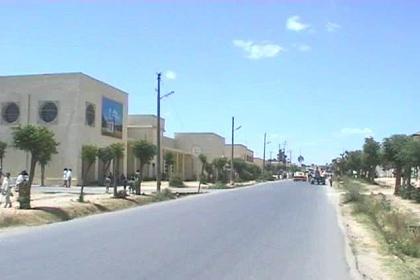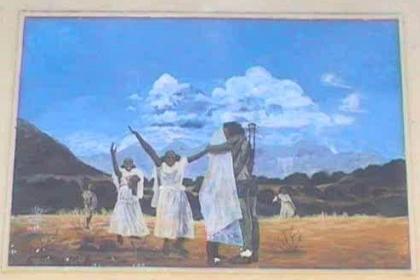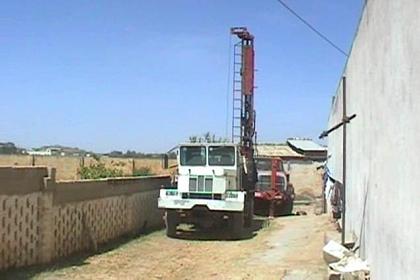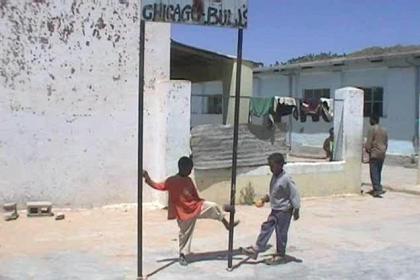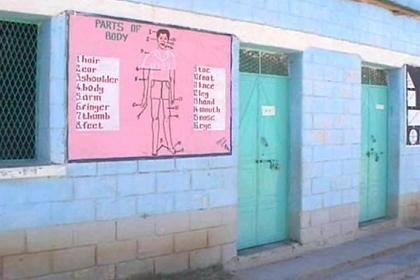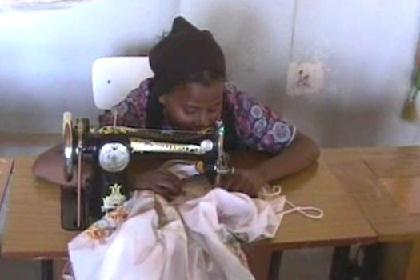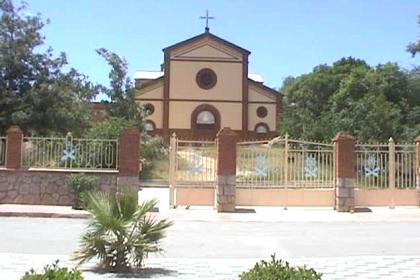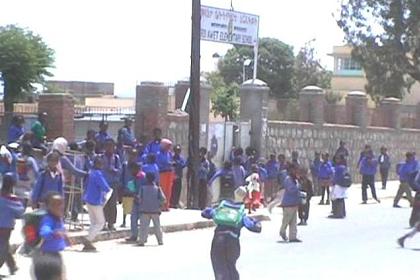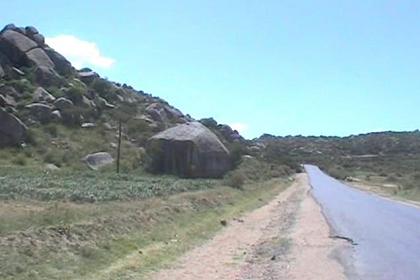Dekemhare Eritrea - September 23rd 2002
Many of the small toys, pencils, balloons and tennis balls are still left in the suite case in the apartment. Today I will bring everything that is left to the orphanage in Dekemhare. I learned about the orphanage when I met Marijke Nijhuis in the Asmara post office in May 2001. She told me about the Dutch / German interregional organization Child Care Afrika, that supports the Dekemhare orphanage that houses 140 orphans. I visited Dekemhare in 1999 and remembered the village as a bit dull. So the visit to the orphanage is going to be the most exiting part of the trip to Dekemhare.
The bus to Dekemhare leaves from the same bus terminal as the buses to Adi Keih / Senafe. Each bus terminal serves a specific region in Eritrea. The official price of the ticket to Dekemhare is 4.75 Nakfa. Everyone pays 5 Nakfa, so I assume the boy selling the tickets earns some 6 Nakfa per trip (0.40 euro / dollar). The trip in the brand new mini bus is very comfortable.
In one of the local snack bars, I ask for my favorite lunch, the egg burger, always combined with coca cola in anticipation of heath problems so natural in a country with low quality tap water (that is used to clean the vegetables on my egg burger) Than I ask for the orphanage. The local people tell me to take a cab. It is to far to walk. Not knowing the directions in this small village I accept their advice. The taxi brings me to the orphanage in just two minutes, so it will be easy to walk when I go back to the bus station.
The name "Faith Mission" is written in metal work above the gate of the compound. I ask for the manager of the orphanage and ask him if he knows Marijke Nijhuis and Child Care Afrika, afraid that there is more than one orphanage in Dekemhare. "Marijke was here a month ago. Why do you ask?". I explain my situation and offer him the bag with the toys. The next half hour he shows my all the buildings on the compound and the progress they make thanks to the gifts of Child Care Afrika. New showers, bath rooms, toilets, fresh painted interior walls.
The most important accomplishment of the donations of Child Care Afrika is the presence of a huge drilling machine on a truck. So far the have reached a depth of 81 meters, but the water is brackish, so they will have to drill deeper. "The salt is bad for the children's hair and it is of bad taste", the manager explains. The orphanage has its owns stables with a few cows, a poultry farm and maize fields. After visiting all the buildings I picture the children of the orphanage and we visit the Dekemhare high school on the other side of the street. Here the boys and girls receive lessons in technical skills. Big workshops to produce wooden and metal furniture, cooking and sewing classes.
After the guided tour we drink cola and the manager asks me to bring some messages to Marijke. He also wants me to make inquiries how much it will cost to import cows from Holland. "The Dutch cows are very good for producing milk and would be a great benefit to the nutrition of the children." I tell him I have seen hundreds of Dutch cows in Elabered, but the managers tells me they are not for sale, but are used for the production of milk in the Anseba region. On the wall of the staff room hangs a big star with the words "Danke Schön / Dank U Wel". It must have been one of the remainders of Marijke's visit a month ago.
After my visit I walk back in the direction of the bus station, snaking through some of the smaller streets and alleys of the village. At the primary school I tease the children with my camera. They do their best not to get in the picture. I follow the road to Asmara to find the huge stone with inscriptions I have seen when we passed with the bus. One of the sides is shaped to be flat and in scripted with the text "A promuvera la prosperita della colonia covernando. Ferdinando Martini, Il Ro corpo di truppe coloniale".
Boy giving out the tickets in the mini bus to Dekemhare.
Main street of Dekemhare.
The wall painting against one of the houses on the main street.
Drilling for good quality water at the orphanage of Dekemhare.
Playground for the children at the orphanage of Dekemhare.
One of the classrooms at the orphanage in Dekemhare.
Girl practicing on the sewing-machine at the Dekemhare high school.
Little catholic church in Dekemhare.
Primary school of Dekemhare.
Plaque marking the opening of the road from Asmara to Dekemhare
by Ferdinando Martini two kilometers outside Dekemhare.
